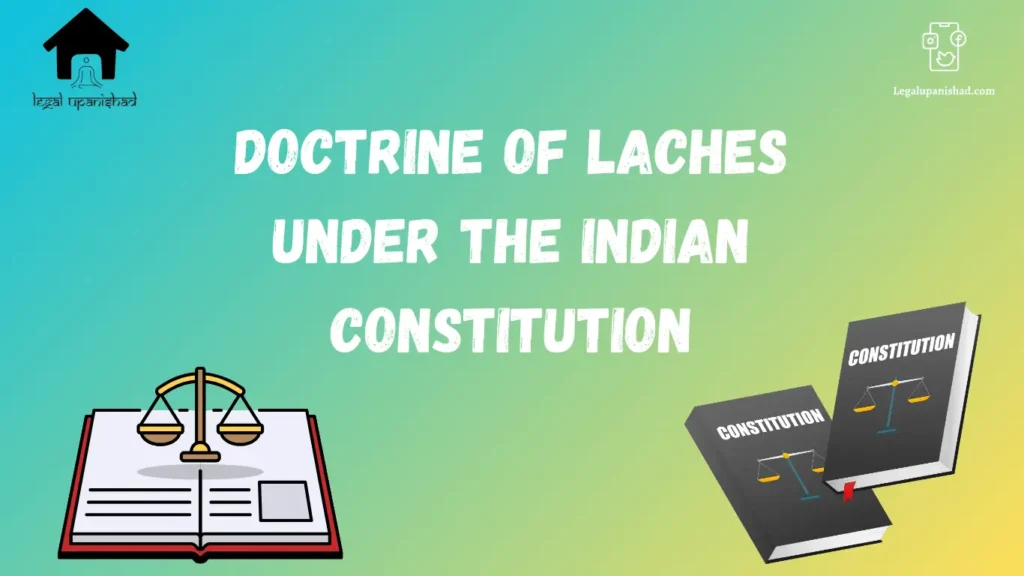This article on ‘Doctrine of Laches under the Indian Constitution: All You Need to Know’ was written by Samriddha Krishna Behera, an intern at Legal Upanishad.
Introduction
The doctrine of laches is a legal theory that emphasises the significance of asserting one’s rights in a timely and diligent manner. It effectively prevents a party from pursuing legal redress if they have been unreasonable in advancing their claim, causing prejudice to the other party. While the theory has its origins in equity, Indian courts have recognised and implemented it as a vital instrument for ensuring fairness and efficiency in the functioning of justice.
This article dives into the doctrine of laches as it applies to the Indian Constitution, examining its application, major aspects, and relevance in the Indian legal structure. Laches arose in equity, which developed alongside the common law system. To accomplish fairness and justice, equity refers to a collection of legal concepts that strive to enhance and, in some situations, exceed the rigorous requirements of common law. The doctrine of laches originated to avoid the enforcement of stale claims and to increase court efficiency by motivating parties to assert their rights vigorously.
Understanding the Doctrine of Laches
The law of laches, commonly referred to as the doctrine of unjustified delay, states that a person who neglects or fails to enforce their rights within an appropriate time frame may be precluded from claiming justice. It is based on the idea that permitting a claim to be made after a long period of time and altered circumstances would be unreasonable because it would bias the opposing party or undermine the judicial system’s integrity. The idea is based on the Latin maxim ‘Vigilantibus Non Dormientius Aequitas Subventil,’ which translates as ‘Equity supports those who are paying attention rather than those who sleep on their rights.’
The doctrine of laches is based on the idea that a party can’t fall asleep on their rights and expect a court to award remedies after a significant amount of time has passed and situations have changed. It tries to avoid the unfairness that may result from a long wait in presenting a legal claim, which could harm the other party’s position.
E.g., Y and Z worked as farmers. Their properties were practically adjacent to each other. Y begins to expand his property by producing crops on Z’s land. Z was well aware of this, yet he never brought it up with Y. Z filed a lawsuit against Y after 18 years. In this example, it will be claimed that Z took an unusually long time to file a suit, despite the fact that Z was well aware of the situation and chose not to take any action. As a result, the defendant might invoke the law of laches to demonstrate that Z has slept on his rights.


Relevance in the Indian Judicial System
In most circumstances, the petitioner’s delay in launching a lawsuit benefits the opposing party. Because of the wait, witnesses leave, memories fade, and evidence vanishes. It assists the defendant in defending against this theory and transfers the burden of proof to the petitioner. The petitioner must provide a plausible explanation for the delay. Article 32 guarantees the right to petition the court, but it does not limit the judge’s discretion in granting relief.
The doctrine of laches has been applied in a variety of legal contexts within the Indian legal system, including constitutional disputes. While the theory of laches is not officially mentioned in the Constitution, Indian courts have relied on its principles in order to ensure the efficiency of justice delivery and avoid the misuse of legal remedies.
- Preservation of Legal Rights: The doctrine of laches urges parties to declare their rights and claims as soon as possible. Establishing a time restriction for taking legal action, guarantees that parties do not waste time pursuing remedies and helps to protect the integrity of the judicial system.
- Preventing bias: Delaying the assertion of rights might lead to bias on the part of the opposing party. Laches theory seeks to avoid such bias by deterring parties from resting on their rights until situations shift in their favour. It guarantees that all sides have the same chance to put forward their case while their evidence is still fresh.
- Legal Efficiency: It is critical to have an efficient court system so that conflicts are resolved in a timely manner. The doctrine of laches enhances efficiency by avoiding needless delays and preventing stale claims from cluttering courts. It encourages plaintiffs to file their claims within an appropriate period of time, allowing for the efficient administration of justice.
- Fairness and equality: The doctrine of laches is inextricably linked to fairness and equitable ideals. It discourages parties from taking advantage of the legal system by intentionally postponing their claims and demanding remedies only when the circumstances are favourable to them. The idea guarantees that all parties receive treatment equally and on an equal basis by requiring fast responses and attentiveness.
Key Elements of the Doctrine
Certain criteria must be proven in order to properly utilise the theory of laches. These are some instances:
- Excessive Delay: The party seeking remedy must have waited an unreasonable amount of time to establish their rights. The delay is evaluated based on the nature of the claim, the reason for the delay, and the prejudice created for the opposing party as a result of the delay.
- Changed Circumstances: During the delay, time should have passed and circumstances should have changed, possibly affecting the opposing party’s rights and interests.
- Prejudice: As a result of the prolonged assertion of rights, the opposing party must have incurred prejudice or hardship. This prejudicial mindset should not be theoretical but concrete and verifiable.
Importance in the Indian Legal System
The doctrine of laches is crucial in Indian law, particularly when it comes to constitutional rights. It guarantees that people or companies do not sit on their claims forever, hoping for favourable conditions. The idea supports the rule of law, impartiality, and efficiency in the administration of justice by mandating timely action and vigilance.
In matters involving public interest litigation (PIL), the courts might reject a petition if there has been an undue delay in submitting the claim, especially where it concerns issues impacting a substantial segment of society.
Furthermore, the idea of laches protects against the misuse of legal remedies. It inhibits litigants from manipulating the judicial system to harass or delay their opponents, making sure that justice is not unreasonably delayed or denied.


Case Law related to Doctrine of Laches
The petitioner in Ved Prakash Goel v. S.D. Singh (2020) challenged the ruling relating to the seniority list, which was finalised in May 2005. There is no such rationale that explains any circumstances that prevented the petitioner from raising this concern within a reasonable time frame. The petitioner’s concern would affect the others as well, and if reopening an issue affects the established rights of the other parties, that claim would be denied. If the question is about payment or a pension fixation, it can be considered since it will not affect the rights of a third party. The doctrine of laches will not be applied here since the petitioner provided no reasonable explanation for the delay.
Conclusion
Though not officially stated in the Indian Constitution, the idea of laches is important in the Indian legal structure. It is a critical principle for ensuring timely statements of legal rights and avoiding prejudice to the opposing party. The doctrine of laches adds to the efficiency and fairness of the Indian legal system by emphasising the significance of vigilance and fast response. Its use in constitutional disputes, particularly public interest litigation, emphasises the need for timely settlement of issues impacting society as a whole.
The idea of laches emphasises the significance of taking action and being diligent in claiming one’s rights in a timely manner. Its foundation in equity reflects its primary goal of establishing fairness and justice. The doctrine of laches serves an important role in safeguarding the integrity of the law by prohibiting the implementation of stale claims and encouraging efficiency in the judicial system. Its significance stems from establishing a balance between the protection of legal privileges and the prevention of bias, thereby helping to ensure a fair and efficient administration of justice.
As a result, this theory may be described as a watchdog in a legal system of justice, ensuring that only the appropriate cases are heard and that any unnecessary delay in bringing a claim is a reprimand for the petitioner.
References
- Kanisha Goswami, Doctrine of laches : a comprehensive analysis, iPleaders Blog, 9 March 2022, available at: https://blog.ipleaders.in/doctrine-of-laches-a-comprehensive-analysis/
- Doctrine of Laches, Byjus, available at: https://byjus.com/free-ias-prep/doctrine-of-laches/
- Doctrine of Laches: Meaning, Purpose, Elements & Difference from Statue of Limitation!, Testbook, 9 August 2023, available at: https://testbook.com/ias-preparation/doctrine-of-laches
